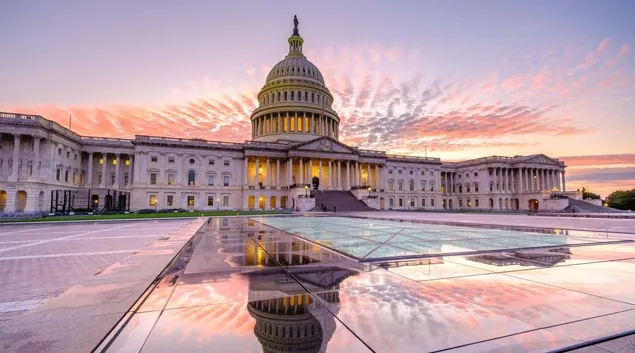
Photo: John Baggaley/Getty Images
A bipartisan group of lawmakers has sent a letter to the Department of Health and Human Services, asking the agency to cancel an upcoming rebate pilot for drugs purchased by hospitals under the 340B Drug Discount Program.
If the pilot remains in effect, the lawmakers are asking for more information on how HHS intends to protect hospitals against additional administrative costs.
According to the group of about 163 lawmakers, Congress intended the 340B Program to enable safety net providers to stretch scarce federal resources as far as possible – reaching more eligible patients and providing more comprehensive services.
An "unchecked" model, the lawmakers said, "would severely undermine that purpose."
In particular, they're concerned that the pilot program will cause damage to community health centers, safety net hospitals and other providers that rely on the 340B program.
WHAT'S THE IMPACT
The rebate model pilot program will require all covered entities to purchase drugs on the Centers for Medicare and Medicaid Services' Medicare Drug Price Negotiation Selected Drug List at the wholesale acquisition cost. Lawmakers said this is the highest sticker price that manufacturers offer, which is rarely actually paid by purchasers in the healthcare system.
This, according to the letter, will require 340B providers to front substantial amounts of cash to drug companies in hopes that a rebate will be paid.
Lawmakers project that if the entire 340B rebate program moved to a rebate model, the average Disproportionate Share Hospital would be forced to put up an estimated $72.2 million annually to manufacturers. That would be a significant hardship to 340B hospitals, which already have substantially lower operating margins compared with non-340B outfits.
A concern expressed by the group is that the rebate model could potentially be used by manufacturers as a "backdoor" to recoup profits that may have been lost as a result of lowering prices through the Medicare Drug Price Negotiation Program (MDPNP).
If HHS decides to continue with the pilot, the lawmakers are asking the agency to provide more details about the program and its guardrails, including justification for what they felt was a "rushed" public comment and application period, what IT systems drugmakers intend to use, how HHS will audit claims validity and rebate issuances, and more insight into the long-term plans for the model.
THE LARGER TREND
In August, the Association of American Medical Colleges lent its support to new legislation that would tweak the 340B statute so that covered entities can use contract pharmacies to dispense outpatient drugs.
According to the AAMC, since 2020, an increasing number of manufacturers have opted to restrict access to 340B discounts for eligible drugs dispensed at contract pharmacy locations, prompting enforcement action by the HRSA.
In response to these actions, several manufacturers sued the federal government, contending that the 340B statute is silent with respect to covered entities' ability to use contract pharmacy arrangements. Litigation related to this matter is ongoing, with the U.S. Court of Appeals for the District of Columbia Circuit issuing a 2024 opinion in favor of the manufacturers.
On July 31, the AAMC sent a letter to Sen. Peter Welch and Rep. Doris Matsui in support of the 340B Patients Act, saying the 340B program plays "a critical role" in supporting the nation's healthcare safety net, enabling providers to care for patients and communities that are historically low income and underserved.
"The program allows safety-net hospitals, many of which are teaching hospitals, to purchase covered outpatient drugs at a discount from manufacturers, and thus, stretch scarce financial resources and maintain, improve, and expand access to care," the AAMC wrote. "Simply stated, the 340B program helps hospitals care for low-income patients."
Email: jlagasse@himss.org
Healthcare Finance News is a HIMSS Media publication.